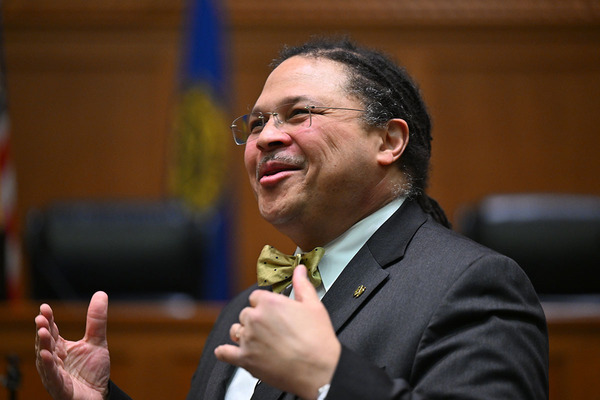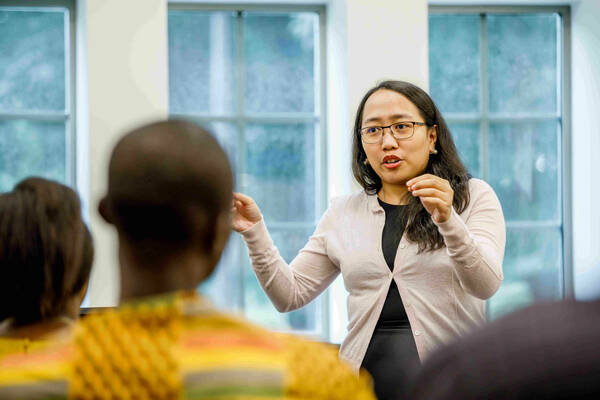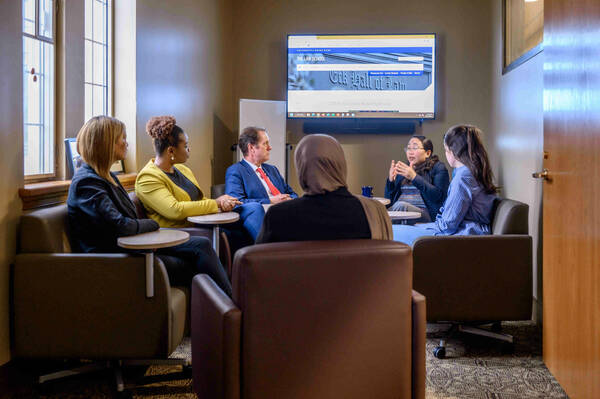Notre Dame Law School establishes new Global Human Rights Clinic
Notre Dame Law School has established a new Global Human Rights Clinic. Launching in spring 2024, the new clinic will be the experiential learning unit of the Law School’s LL.M. Program in Human Rights Law and will be open to J.D. and Human Rights LL.M. students. J.S.D. students will be welcomed as doctoral fellows collaborating on specific clinic projects, while a few select undergraduates will contribute through limited research-focused internships at the clinic.
The new clinic will draw from 50 years of unique international human rights pedagogy and theory of jurisprudence at Notre Dame, which is already being applied by Notre Dame alumni to defend human rights across the world.

The clinic will represent cases at institutions such as the International Court of Justice, Inter-American Court of Human Rights, International Criminal Court and the U.N. Human Rights Treaty Bodies. It will also undertake research and advocacy projects in collaboration with the Office of the U.N. High Commissioner for Human Rights. In addition, the clinic will address cases challenging authoritarianism in the Global South, advocating for individuals who may not typically be represented by other human rights clinics.
“The creation of this new Global Human Rights Clinic is a testament to our unwavering commitment to make a lasting impact. The clinic will actively pursue justice under international law and hold perpetrators accountable, while providing crucial support to those striving for justice in their countries,” said G. Marcus Cole, the Joseph A. Matson Dean and Professor of Law. “As the oldest Catholic law school in the United States, this aligns seamlessly with our mission to train advocates devoted to defending and advancing human rights globally, to champion justice worldwide and to be a force for good.”

That mission builds upon the work of Diane Desierto, the founding faculty director of the clinic. Currently serving as faculty director of the LL.M. Program in International Human Rights Law and professor of law and global affairs, Desierto has made significant contributions since her arrival at Notre Dame in 2021. She revamped the human rights program curriculum, aligning human rights theory and practice with the Law School’s natural law pedagogy; expanded and deepened course offerings in international human rights law; and designed a Graduate Seminar taught by Jean Marc Brissau. This seminar features high-level speakers from Notre Dame Law’s own alumni in the field, alongside international law and human rights academic experts.
Desierto recently joined the Law School delegation to South Africa that honored the African roots of Notre Dame’s Human Rights Program. Delegation members also recognized 50 years of the program’s global contributions through its alumni and celebrated the 75th anniversary of the Universal Declaration on Human Rights. While there, they built partnerships with leading academic institutions, connected with Notre Dame’s human rights LL.M. alumni including South African Constitutional Court Justice Mbuyiseli Madlanga, and concluded with a panel honoring the eminent work of Justice Richard Goldstone at the South African Constitutional Court.
With more than 20 years of experience in international human rights practice, international arbitration and international litigation, Desierto recognized the evolving challenges faced by human rights lawyers in the contemporary world, making the continuity and expansion of the human rights program crucial.
She said, “Growing 15 to 20 international human rights lawyers from all over the world itself creates a multiplier effect as they serve innumerable individuals and groups for the rest of their lives. We equip them to make a lifelong difference in their respective countries. That is our true mandate and mission.”
A board of advisers will provide input to Cole, Desierto and Miller. The board includes Michael Addo, Roger Alford, Paolo Carozza, Nicole Stelle Garnett, Jim Seckinger, O. Carter Snead and Francisco Urbina.
The clinic will offer its courses starting spring 2024, with two-credit courses in the spring semesters and four-credit courses in the fall semesters.

In fall 2024, the clinic will formally launch its inaugural ND Law Global Human Rights Conference, showcasing Notre Dame Law School’s distinctive pedagogy and practice of natural law, jurisprudence and international human rights law. The conference will platform Notre Dame Law School’s ongoing engagement with international law and human rights experts from around the world.
As part of the ongoing integration of the clinic into the Law School community, it will host a separate Notre Dame Law School Global Human Rights Lecture Series. This series will regularly feature distinguished international law and human rights judges, experts, academics, diplomats and practitioners.
To learn more, visit https://law.nd.edu/news-events/news/notre-dame-law-school-establishes-new-global-human-rights-clinic/.
Originally published by at law.nd.edu on Nov. 16.
Latest International
- Prioritizing prenatal care may decrease low birth weight outcomes in The Gambia, Notre Dame research findsA new study co-authored by University of Notre Dame researchers highlights the importance of prenatal care for improving the health of mothers and newborns, providing evidence that can inform policy.
- Navigating the waters of peace: Researchers address challenges, opportunities in implementation of Colombia's Peace AgreementNearly half of the commitments outlined in Colombia's historic peace accord face significant challenges and may not happen in time unless policymakers make several key interventions, warns a new report from Notre Dame's Peace Accords Matrix. The report offers a blueprint to salvage an accord that has lagged behind its implementation deadlines, putting its legacy at risk. It highlights timely fixes that can strengthen the agreement.
- Partial peace deals may facilitate comprehensive accords, offering roadmap for policymakers, practitionersPartial peace agreements — deals that address targeted issues on the way to larger comprehensive accords — could provide a blueprint for peacebuilding policymakers and practitioners, according to new University of Notre Dame research.
- CANCELED: University to host Cardinal Pedro Barreto of Peru and Cardinal Peter Turkson of Ghana as part of Notre Dame ForumAs part of the 2024-25 Notre Dame Forum, Cardinal Pedro Ricardo Barreto Jimeno, S.J., of Peru and Cardinal Peter Kodwo Appiah Turkson of Ghana will visit the University of Notre Dame to participate in a conversation with President Rev. Robert A. Dowd, C.S.C., at 11:30 a.m. April 25 in the Smith Ballroom of the Morris Inn. The conversation is open to the public and will also be livestreamed for both Spanish-speaking and English-speaking audiences.
- ‘Who the messenger is matters’: Cultural leaders can positively influence population growthFertility rates across the world have been steadily dropping since 1950. Pinpointing the reasons is at the heart of Lakshmi Iyer's work as a professor of economics and global affairs. Her research exemplifies the kind of population-level research that Notre Dame Population Analytics (ND Pop), a new research initiative at the University, seeks to foster.
- Lessons from Venezuela’s democratic collapse: How opposition movements can defy autocratic leadersLaura Gamboa, a political scientist at the University of Notre Dame, explores how opposition movements navigate authoritarian regimes in a study of Venezuela's political transformation. The research analyzes the effectiveness of various strategies, including electoral participation, in the face of eroding democratic norms.













